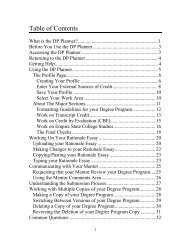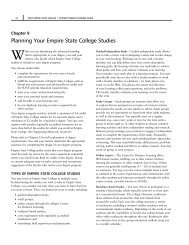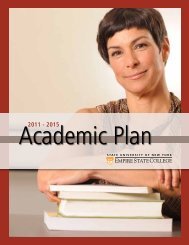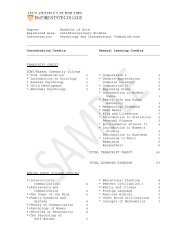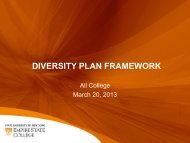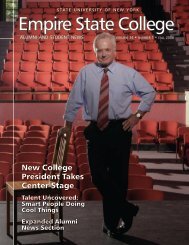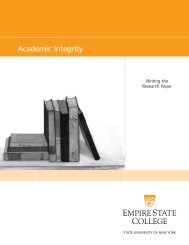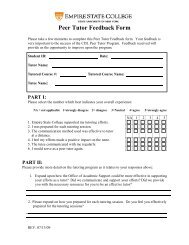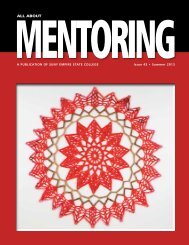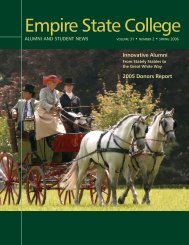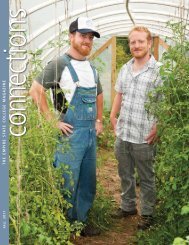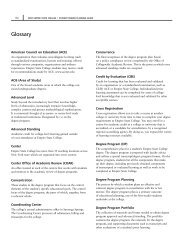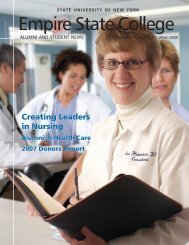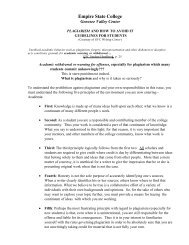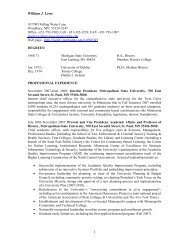All About Mentoring Spring 2011 - SUNY Empire State College
All About Mentoring Spring 2011 - SUNY Empire State College
All About Mentoring Spring 2011 - SUNY Empire State College
You also want an ePaper? Increase the reach of your titles
YUMPU automatically turns print PDFs into web optimized ePapers that Google loves.
24<br />
I was not prepared for the stories of how the<br />
participants’ knowledge-making experiences<br />
led them to reach out to those who<br />
continued to struggle, or how the evidence<br />
of another’s setback seemed to genuinely<br />
sadden them. Their focus seemed to shift<br />
from being self-absorbed, to the world<br />
around them, or caring for others. This<br />
capacity for empathy signaled a fundamental<br />
change for them in the way they perceived<br />
themselves and those around them – from a<br />
stance of doubting to believing.<br />
There were others who characterized their<br />
defining moments as those experiences<br />
that taught them unexpected skills such<br />
as those learned in the construction<br />
technology classes.<br />
[My best moments were] when we<br />
built the first house, the Habitat [for<br />
Humanity] house that we were building.<br />
When we finally got done with it – wow –<br />
‘look what we did, just a bunch of us.’<br />
I think it was 15 of us that got to go out<br />
all the time. Like ‘look what we did, we<br />
made a house you know,’ and then we got<br />
to have the people come, the owners –<br />
yeah, that was really cool – to meet them.<br />
It was awesome that we could. You<br />
know – as a girl, I didn’t really ever think<br />
about construction. I don’t know if I want<br />
to do something like that – that’s a man’s<br />
job – but it’s really not. Especially with<br />
the electrical part – you use your brain<br />
more and you don’t have to do all the<br />
heavy lifting and all that stuff, but it’s still<br />
just as interesting building the houses –<br />
the experience was awesome, just the<br />
people. It made me feel 100 percent better<br />
about myself, about educating myself and<br />
just being more knowledgeable, period.<br />
Connection Between Learning<br />
and Reintegration<br />
As the participants shared their experiences<br />
returning to their communities, they<br />
provided valuable insight about education<br />
as a tool for successfully overcoming<br />
roadblocks. While the data clearly pointed<br />
to the difficulties the participants have<br />
faced, the data also underscored the<br />
significance of their feelings about the<br />
empowerment they gained from learning.<br />
According to the findings, the ability to<br />
find and keep a job had more to do with<br />
the participants’ finesse at maneuvering the<br />
maize of obstacles put in place by societal<br />
norms that bar felons from being given a<br />
chance to work. Most of the women had<br />
some difficulty finding employment, even<br />
though they could demonstrate aptitude<br />
based on their education. While the majority<br />
was working, some were only able to get<br />
part-time employment, and others had not<br />
been able to find meaningful or challenging<br />
jobs. They said repeatedly, “Society is very<br />
unforgiving.”<br />
The participants’ stories offered some<br />
examples of how higher education aided<br />
in securing employment. Moreover, their<br />
exposés about learning as a transformational<br />
experience of self were, perhaps, as<br />
influential in successful employment<br />
outcome, and certainly paramount in giving<br />
them the courage to overcome the many<br />
obstacles they face with criminal records.<br />
Schuante, who was hired shortly after<br />
release in the field in which she was trained,<br />
received an outstanding evaluation for her<br />
six-month review. She gives the credit to her<br />
college education because it changed her<br />
outlook about herself and her capabilities as<br />
a worker:<br />
<strong>All</strong> this comes from [college]. I never<br />
thought this would happen in my life. If<br />
it wasn’t for [college] and me going in<br />
and getting that education, and really<br />
coming out and doing something with<br />
it – applying myself … and that right<br />
there, everything that I have, I could just<br />
cry right now because of everything that<br />
I have. Before I went in, I went in with<br />
nothing, if it wasn’t for this class, the<br />
program, I’d a came out with nothing.<br />
Telemarketing is the only thing that’s<br />
available for someone that doesn’t have<br />
no experience or nothing like that. So<br />
because of [college], I’ve come a long<br />
way. And also, education has just changed<br />
my life totally, if it wasn’t for the things<br />
I got under my belt as far as those<br />
credentials, I’d be out there struggling at<br />
telemarketing or working at a hamburger<br />
joint. I just have a different outlook on<br />
everything.<br />
In Schuante’s earlier description of self, she<br />
used words such as “lost,” “hopeless” and<br />
“depressed” to define her place in the world.<br />
She now views the tremendous change in<br />
her life as:<br />
I mean now – now I feel so good. I<br />
mean, look at the things I accomplished,<br />
I actually have a GED, and then I have<br />
college courses, and I did quite a few of<br />
the college courses, and it’s like it just feels<br />
good to me.<br />
While Schuante was successful in securing<br />
a job where she could apply her skills,<br />
the majority of the participants reported<br />
employment as the primary challenge<br />
after release from prison. In spite of this<br />
ongoing challenge, the women viewed their<br />
educational experience as one that fueled<br />
their sense of self-worth and their resolve to<br />
live their lives differently.<br />
Synthesis of Learning and<br />
Community Re-entry Experiences<br />
Through the participants’ expressions of<br />
the influence of learning on their personal<br />
growth, or ways of knowing, and their<br />
hope for their futures, I was able to better<br />
understand what education seems to<br />
have done for these women. They knew<br />
themselves differently. They could reflect,<br />
they could choose, they built new capacities<br />
that reach beyond the skills learned through<br />
their course work. As a summarizing essay<br />
of sorts, they shared their feelings about life,<br />
the struggles that have shaped them, those<br />
who remain significant in their lives, and<br />
their educational journeys.<br />
The findings underscored the significance<br />
of the change that has occurred for the<br />
participants relative to self-perceptions.<br />
<strong>All</strong> of the participants noted positive<br />
attributes about themselves such as<br />
“someone with a good personality who<br />
loves people and is also a good motivator,<br />
good influencer … a very good person,”<br />
“very independent and focused,” “I like<br />
me, actually I love myself now … I didn’t<br />
before,” “I’m proud of myself,” and<br />
“happy, motivated, ready to learn …<br />
I adapt well, extremely well.” Two of<br />
the participants described themselves as<br />
“survivors.” Although, their perceptions<br />
of self were more positive, some of<br />
participants used descriptors that pointed<br />
to their tentativeness. One interviewee<br />
shared that she still had “problems,”<br />
“but the problems that I have I deal with<br />
now, I deal with them.”<br />
suny empire state college • all about mentoring • issue 39 • spring <strong>2011</strong>



